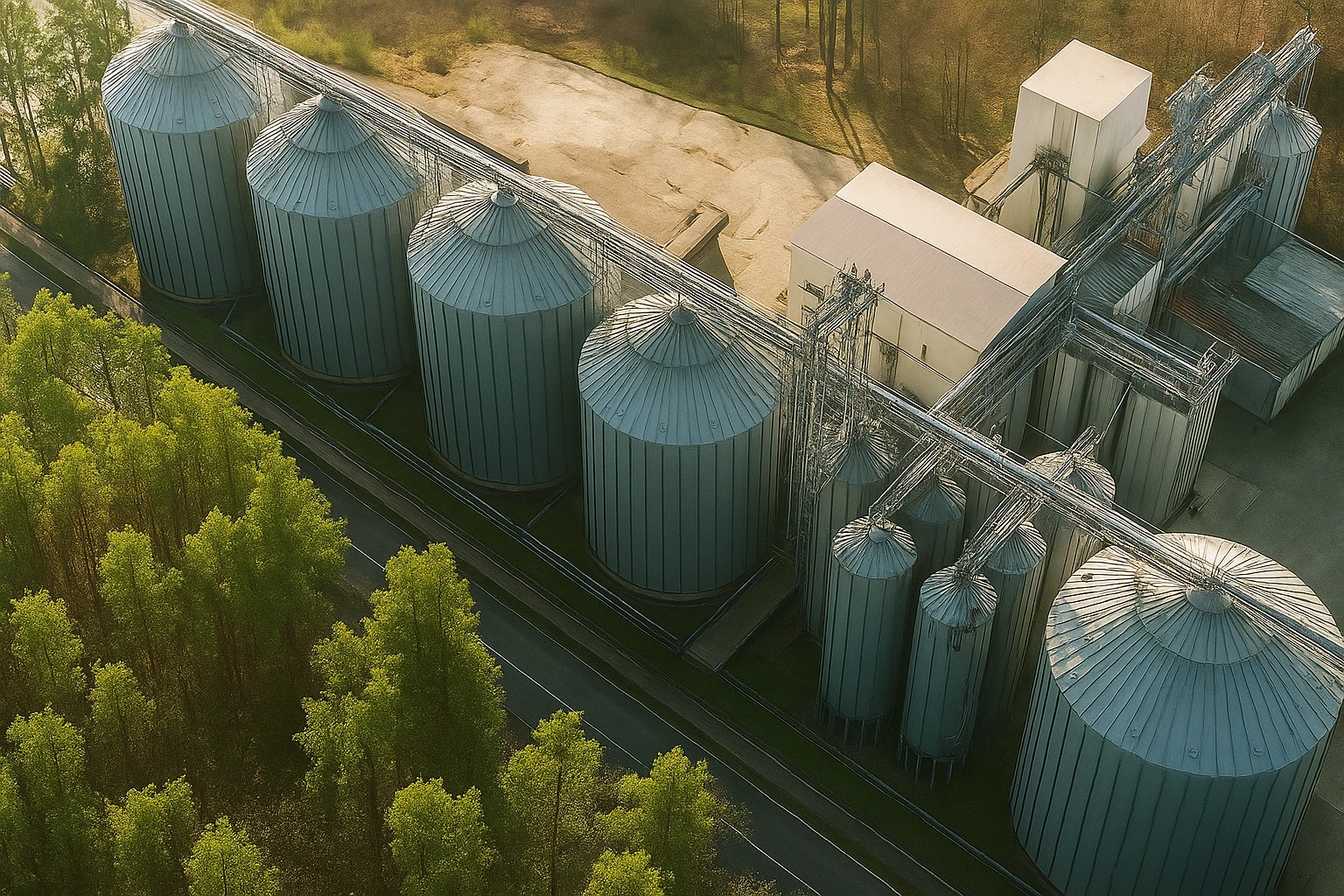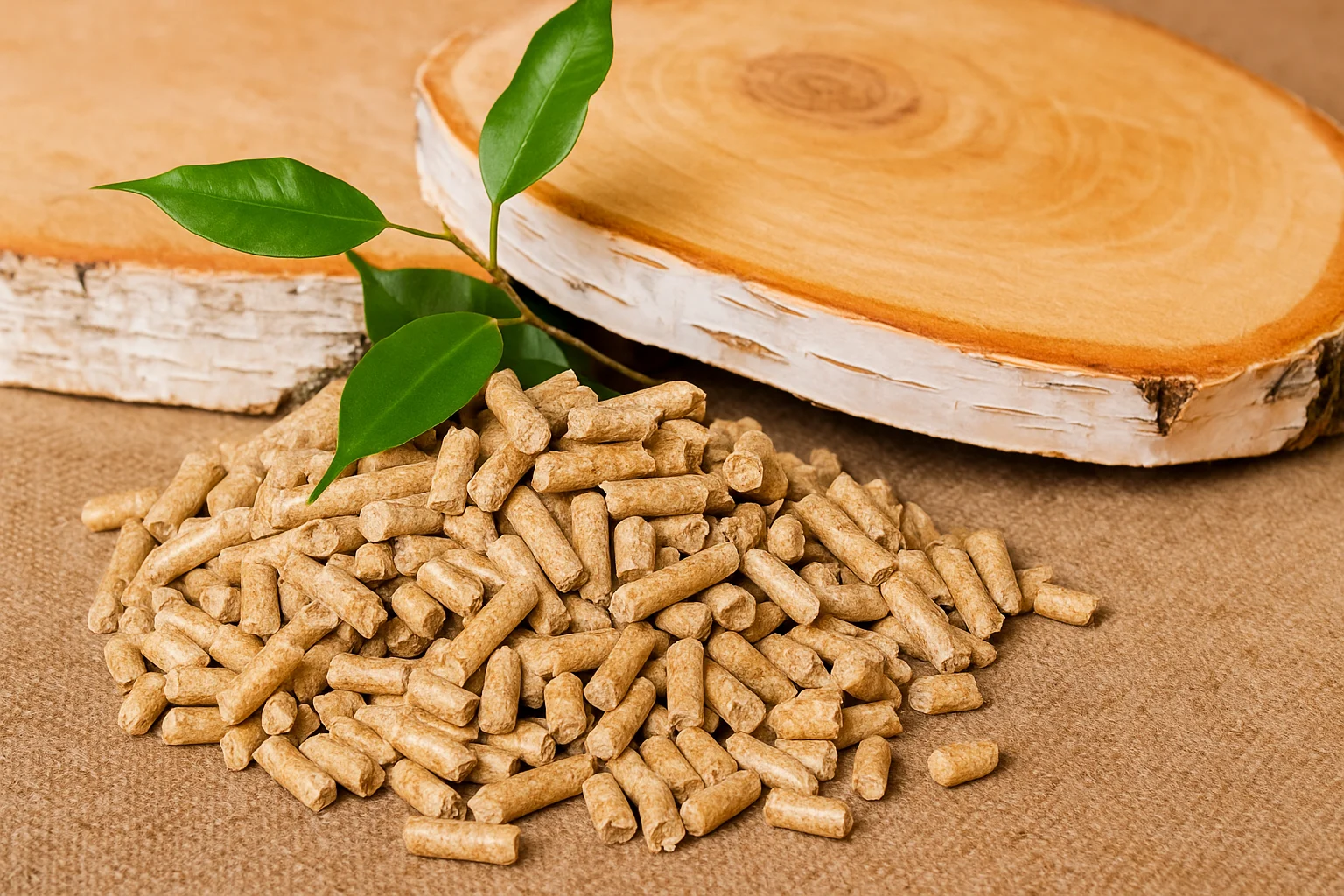
Feb 10, 2025
The Potential of Biomass Energy in Indonesia: Opportunities & Challenges

Bintang Fikri Fauzan
Market Analyst – Biomass Commodities
Indonesia sits at the crossroads of a growing global energy transition. As the world shifts away from fossil fuels, countries are looking for cleaner, renewable alternatives. Biomass energy represents a significant opportunity for Indonesia—but it also comes with real challenges that need to be addressed.
Why Indonesia Matters in the Biomass Energy Story
Indonesia is the world’s largest archipelago with over 17,000 islands. This vast nation has something that many countries desperately need: abundant natural resources that can be converted into biomass energy.
With extensive forests, large agricultural sectors, and a growing palm oil industry, Indonesia generates massive amounts of organic materials that can become fuel. At the same time, the country is strategically located near major Asian markets that are actively buying biomass energy products like wood pellets.
This combination—abundant resources and proximity to customers—creates unique opportunities for Indonesia in the global biomass energy market.
Indonesia’s Biomass Resources: What We Have
Indonesia’s biomass energy potential comes from several sources.
Forest Resources
Indonesia has vast forest areas that produce wood materials naturally:
- Logging operations create sawdust and wood chips
- Forest management produces branches and wood waste
- Sustainable forestry can provide ongoing biomass supply
- Dead trees and forest thinning create additional materials
These forest resources can supply raw materials for wood pellets and other biomass energy products without harming healthy forests when managed properly.
Agricultural Waste
Indonesia is a major agricultural producer, creating huge amounts of biomass waste:
- Rice husks from rice production
- Palm oil waste from plantations and mills
- Coconut shells and husks
- Sugarcane bagasse
- Corn stalks and other crop residues
Currently, much of this material is burned in fields or left to rot. Converting it to biomass energy would be both economically beneficial and environmentally better.
Palm Oil Industry Byproducts
Indonesia is the world’s largest palm oil producer. This industry creates enormous amounts of biomass:
- Empty fruit bunches after oil extraction
- Palm kernel shells
- Palm fiber
- Old palm trees when plantations are replanted
These materials have excellent potential for biomass energy conversion. Many palm oil mills already use some of this biomass for their own energy needs, but much more could be utilized.
Wood Processing Waste
Indonesia’s furniture and timber industries generate significant waste:
- Sawdust from sawmills
- Wood shavings and chips
- Offcuts and rejected pieces
- Bark and wood scraps
This waste is ideal for making wood pellets—it’s already in small pieces and doesn’t require cutting down additional trees.
The Market Opportunity: Who Wants Indonesian Biomass?
The demand for Indonesian biomass energy products is growing both domestically and internationally.
Domestic Market Growth
Within Indonesia, interest in biomass energy is increasing:
Power Plants: Indonesian power companies are exploring biomass co-firing—burning wood pellets alongside coal to reduce emissions while using existing infrastructure.
Industrial Users: Factories need heat for their processes. Biomass energy offers a cheaper alternative to diesel or natural gas in many cases.
Rural Electrification: Remote areas without grid connections can use biomass energy systems powered by local agricultural waste.
Export to Japan
Japan is one of the world’s largest importers of wood pellets and biomass fuel:
- Strong environmental policies driving demand
- Limited domestic biomass resources
- Need to replace nuclear and coal power
- Government support for biomass energy
- Long-term contracts offering stability
Japan’s proximity to Indonesia makes shipping economical. Indonesian suppliers can deliver products more cheaply than distant competitors from North America or Europe.
Export to South Korea
South Korea is rapidly expanding its biomass energy use:
- Aggressive renewable energy targets
- Growing demand for wood pellets
- Government auctions creating guaranteed markets
- Preference for nearby suppliers
- Long-term purchase agreements
Like Japan, South Korea needs reliable suppliers who can deliver consistent quality at competitive prices—an opportunity perfectly suited to Indonesian producers.
Other Asian Markets
Beyond Japan and Korea, other opportunities are emerging:
- China’s growing interest in cleaner energy
- Vietnam’s expanding industrial sector
- Thailand’s renewable energy programs
- Other Southeast Asian nations
These markets may not be as large as Japan or Korea yet, but they represent additional growth potential.
European Market
Europe has a well-established biomass energy market:
- Large existing demand for wood pellets
- Strict quality standards
- Higher prices for premium products
- Longer shipping distances from Indonesia
While European buyers traditionally source from closer suppliers, Indonesian producers who can meet quality standards have opportunities here too.
The Business Opportunities in Indonesian Biomass
The biomass energy sector offers various business opportunities across the value chain.
Production and Manufacturing
Setting up facilities to produce wood pellets or process biomass:
- Converting waste materials into valuable fuel
- Meeting growing export demand
- Serving domestic industrial users
- Creating jobs in rural areas
Export Business
Connecting Indonesian biomass producers with international buyers:
- Understanding quality requirements of different markets
- Managing logistics and shipping
- Negotiating long-term supply contracts
- Building relationships with overseas customers
Domestic Distribution
Supplying biomass energy products within Indonesia:
- Delivering to power plants and industries
- Supporting the growth of domestic biomass use
- Building local supply chains
- Serving smaller customers who need reliable supply
Raw Material Supply
Collecting and supplying feedstock for biomass production:
- Aggregating agricultural waste from farmers
- Collecting wood waste from sawmills
- Sourcing palm oil industry byproducts
- Managing sustainable forestry operations
Equipment and Services
Supporting the biomass industry with needed services:
- Selling pellet production equipment
- Providing maintenance and repair
- Offering consulting on biomass operations
- Transportation and logistics services
The Challenges: What’s Holding Indonesia Back?
Despite huge potential, Indonesia’s biomass energy sector faces real challenges that need solutions.
Infrastructure Limitations
Transportation: Moving biomass materials from rural production areas to ports or customers is difficult:
- Poor road conditions in some areas
- High transportation costs
- Limited port facilities equipped for bulk biomass
- Need for proper storage facilities
Processing Facilities: Indonesia needs more modern biomass processing plants:
- Limited pellet production capacity currently
- Equipment and technology often imported
- High initial investment costs
- Need for skilled workers to operate facilities
Quality Consistency
International buyers demand consistent quality:
- Standardized moisture content
- Predictable ash levels
- Uniform pellet size
- Reliable energy content
Many Indonesian producers are still developing quality control systems to meet these international standards consistently.
Sustainable Sourcing Concerns
Buyers want assurance that biomass comes from sustainable sources:
- Proper forest management practices
- Not contributing to deforestation
- Respecting local communities
- Environmental certifications
Indonesian producers need to demonstrate sustainable practices to access premium markets and prices.
Regulatory Environment
Government policies affect the industry:
- Sometimes unclear regulations on biomass use
- Export procedures that can be complex
- Need for supportive policies to encourage investment
- Balance between domestic use and export
Clearer, more supportive regulations would help the industry grow faster.
Financing Challenges
Starting or expanding biomass operations requires capital:
- High upfront costs for equipment
- Banks sometimes unfamiliar with biomass sector
- Need for working capital to buy raw materials
- Export customers may require proof of capacity
Better access to financing would help more businesses enter the sector.
Competition from Other Countries
Indonesia isn’t the only country targeting Asian biomass markets:
- Vietnam is expanding production
- Malaysia has similar resources
- Other Southeast Asian nations are interested
- Established suppliers from other regions
Indonesian producers need to compete on quality, reliability, and price.
Technical Knowledge
The industry needs more expertise:
- Understanding international quality standards
- Operating pellet production equipment efficiently
- Managing export logistics
- Meeting customer specifications
Training and knowledge sharing can help address this gap.
How Indonesia Can Overcome These Challenges
Despite the obstacles, there are practical ways to address these challenges.
Improving Infrastructure
- Investing in better rural roads
- Developing biomass-friendly port facilities
- Building storage facilities in key locations
- Creating biomass industrial zones with good access
Building Quality Systems
- Adopting international quality standards
- Investing in testing equipment
- Training quality control staff
- Learning from established markets
Demonstrating Sustainability
- Obtaining forest management certifications
- Documenting sustainable sourcing practices
- Working with environmental organizations
- Using agricultural waste to avoid deforestation concerns
Policy Improvements
- Clearer regulations for biomass production and export
- Streamlined export procedures
- Incentives for sustainable biomass operations
- Support for infrastructure development
Developing Expertise
- Training programs for industry workers
- Knowledge exchange with established markets
- Technical partnerships with equipment suppliers
- Learning from other countries’ experiences
Industry Collaboration
- Sharing best practices among producers
- Collective marketing of Indonesian biomass
- Joint investments in infrastructure
- Working together on quality standards
Success Stories: What’s Working Now
Despite challenges, some Indonesian biomass operations are already succeeding.
Palm Oil Mills Using Waste
Many palm oil mills now use their biomass waste to generate their own electricity:
- Saves money on energy costs
- Reduces waste disposal problems
- Shows the practical potential of biomass
- Creates blueprints others can follow
Growing Pellet Production
Several Indonesian companies are producing wood pellets for export:
- Meeting international quality standards
- Building relationships with Asian buyers
- Demonstrating that quality production is possible
- Creating employment in rural areas
Agricultural Waste Projects
Some projects are collecting agricultural waste for energy:
- Converting rice husks to power
- Using coconut shells for fuel
- Creating value from waste
- Benefiting farmers with additional income
These examples show that the potential is real and achievable.
The Role of Private Companies
Private businesses are essential to developing Indonesia’s biomass energy potential.
Producers
Companies that convert raw materials to biomass energy products:
- Investing in production facilities
- Developing quality control systems
- Building sustainable supply chains
- Creating employment
Traders and Distributors
Businesses that connect supply with demand:
- Understanding both domestic and export markets
- Managing logistics efficiently
- Ensuring consistent availability
- Building trust with customers
Companies like PT. Guntala Karya Abadi play a crucial role here, using expertise in import, export, and domestic distribution to connect Indonesian biomass with markets that need it.
Service Providers
Supporting the industry with essential services:
- Equipment suppliers
- Logistics companies
- Technical consultants
- Financial services
The Future: What’s Next for Indonesian Biomass?
Looking ahead, several trends will shape Indonesia’s biomass energy sector.
Growing Export Demand
Asian countries’ renewable energy targets ensure continued demand:
- Japan and Korea will need more biomass fuel
- Long-term contracts provide stability
- Premium prices for reliable, quality suppliers
- Room for growth as coal plants convert
Domestic Market Development
Indonesia’s own biomass energy use will likely increase:
- Power plants adding biomass capacity
- Industries seeking cheaper fuel alternatives
- Government support for renewable energy
- Rural electrification projects
Technology Improvements
Better technology will make biomass more competitive:
- More efficient production equipment
- Lower-cost processing methods
- Better quality control systems
- Improved logistics solutions
Sustainability Focus
Environmental concerns will drive the market:
- Preference for sustainably sourced biomass
- Certifications becoming more important
- Buyers willing to pay premiums for proven sustainability
- Opportunities for waste-based biomass
Investment Growth
More capital flowing into the sector:
- Domestic investors seeing opportunities
- International companies partnering with Indonesian firms
- Government support programs
- Better understanding of sector potential among financiers
What This Means for Indonesia
Biomass energy represents more than just a business opportunity for Indonesia—it’s a chance to:
Create Jobs: The biomass sector can employ people in rural areas where jobs are often scarce, from collecting raw materials to operating processing facilities.
Increase Export Earnings: Selling wood pellets and other biomass products to Asian markets brings foreign currency and strengthens trade relationships.
Use Waste Productively: Instead of burning agricultural waste in fields or letting wood scraps rot, Indonesia can convert these materials into valuable products.
Support Rural Development: Biomass operations in rural areas can bring income and infrastructure improvements to underserved communities.
Contribute to Global Sustainability: By providing clean fuel to countries reducing coal use, Indonesia helps global climate efforts while benefiting economically.
Getting Involved in Indonesia’s Biomass Sector
For those interested in participating in this growing sector:
For Businesses
- Assess local biomass resources in your area
- Research market demand (domestic or export)
- Connect with potential buyers and understand requirements
- Partner with experienced traders who know the markets
- Start with manageable scale and grow
For Investors
- The sector needs capital for expansion
- Look for experienced operators with market access
- Long-term export contracts reduce risk
- Growing demand provides positive outlook
- Consider different parts of value chain
For Policymakers
- Support infrastructure development
- Streamline regulations and export processes
- Provide incentives for sustainable operations
- Facilitate training and knowledge development
- Balance domestic needs with export opportunities
PT. Guntala Karya Abadi: Connecting Indonesian Biomass to the World
At PT. Guntala Karya Abadi, we see Indonesia’s biomass energy potential firsthand every day. Our experience in import, export, and domestic distribution gives us unique insight into both the opportunities and challenges.
We work with Indonesian producers to help them access international markets, particularly the growing demand in Japan and Korea. We also import quality biomass products when needed to serve domestic customers reliably.
Our role is to bridge the gap—connecting Indonesian resources with markets that need them, whether domestic or international. We handle the complexities of logistics, quality assurance, and market relationships so producers can focus on production and customers can count on reliable supply.
Whether you’re producing biomass materials and looking for markets, seeking reliable biomass supply for your operations, or interested in entering the biomass trade, we bring the expertise and connections to help you succeed.
The Bottom Line
Indonesia’s biomass energy potential is enormous, but realizing it requires addressing real challenges. The opportunities—both for export and domestic use—are clear and growing. Countries like Japan and Korea need what Indonesia can provide, and Indonesia’s own energy needs are expanding.
Success will come from:
- Investing in quality production
- Building sustainable supply chains
- Developing necessary infrastructure
- Creating supportive policies
- Sharing knowledge and expertise
- Connecting producers with markets
The biomass energy sector isn’t just about energy—it’s about economic development, job creation, waste reduction, and participating in the global transition to cleaner energy.
For Indonesia, biomass energy represents a genuine opportunity to turn abundant natural resources into economic and environmental benefits. The potential is real, the markets exist, and the time to act is now.


